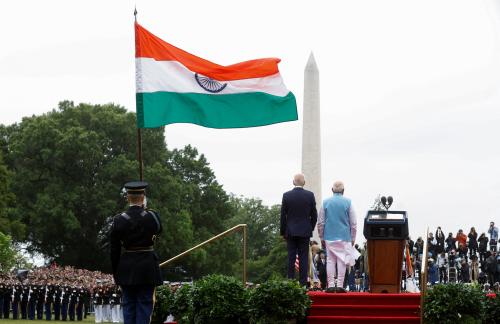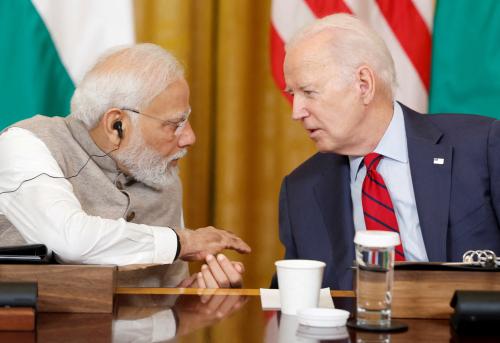The United States and Mexico concluded a transboundary hydrocarbons agreement, officially titled the “Agreement between the United States and Mexico Concerning Transboundary Hydrocarbon Reservoirs in the Gulf of Mexico,” (TBA) in February 2012. The agreement provides the United States substantial geopolitical, energy security and environmental benefits while potentially helping the U.S. oil and gas industry gain access to a huge market that may offer jobs and gains across a long value chain. The Mexican Senate ratified the agreement in April 2012. However, the U.S. Congress needs to enact implementing legislation to give the Department of Interior the authority to play its role in the agreement.
This otherwise uncontroversial agreement is now at risk. After nearly a year of benign neglect from the Obama administration, legislation is now being considered to implement TBA. The TBA is a new type of international agreement, and using proven tools for considering treaties and executive agreements, Congress has an important role to play in its interpretation. Regrettably, without strong leadership and engagement from the administration or Congressional leaders, the U.S. House of Representatives included an unnecessary “poison pill” in its June 27, 2013 version of the authorizing bill. The Senate can do better.
The TBA provides a framework for joint U.S.-Mexican development of oil and natural gas reservoirs extending across their Gulf of Mexico maritime boundary. This would be a significant achievement for U.S. industry, as Mexican constitutional restrictions have prevented international oil and gas companies from operating there in most capacities for 75 years. U.S. geopolitical and energy security interests would also benefit. Lack of foreign capital, investment and expertise has made it increasingly difficult for Mexico to maintain its position as one of the largest crude exporters to the U.S. Mexican exports declined from 1.5 million barrels per day (mmbd) in 2007 to 1.0 mmbd last year. The U.S. Gulf Coast refinery infrastructure is equipped to process comparatively heavier crude grades found in Mexico, Canada and the Middle East. The U.S. has thus replaced Mexico’s declining volumes not with growing domestic supply, but rather imports from the Middle East. Oil revenues account for more than a third of Mexico’s total government revenues. Reductions in this stream thus negatively impact Mexico’s capacity to finance programs related to expanding the rule of law, security and poverty alleviation, where implementation is important for both Mexican and U.S. security interests.
Senior Mexican officials have indicated the transboundary agreement could provide crucial momentum to President Peña Nieto’s sweeping energy reforms proposed on August 12, 2013. Implementation would help prove that Mexico’s energy sector interests could be protected and global energy security enhanced through joint production regimes. This would substantiate arguments of Mexican officials who must convince their colleagues and the public that constitutional energy sector reforms benefit Mexico’s national interests, a contention still somewhat at odds with a powerful, decades-old Mexican narrative. If the U.S. fails to pass the transboundary agreement and signal support for reform, the Mexican government’s enthusiasm to work with the U.S. may dampen and the status quo of declining production and its associated negative impacts could continue. As one means to eventually boost production, Mexico has committed to unilaterally exploring the Gulf maritime border area. While the transboundary agreement offers an opportunity for more robust U.S.-Mexican safety review, de facto U.S. abrogation could poison the well for bilateral collaboration in this area. This may leave U.S. Gulf Coast communities vulnerable to negative environmental impacts from Mexican exploration activities.
The House bill contains language that would introduce secrecy into payments made under the TBA by precluding the revenue transparency provisions of the so-called “Cardin-Lugar Amendment” (Section 1504 of the Dodd-Frank Wall Street Reform Act) from applying to TBA implementation. The Cardin-Lugar Amendment requires oil, gas, and minerals companies to publicly disclose payments to governments, a U.S. requirement that has sparked similar laws in the European Union and are[r1] now under consideration in Canada and beyond. By targeting those bipartisan, robustly supported pro-openness provisions, opponents of transparency are creating opposition to the TBA where none need be present. In raw political terms, the TBA is important but not at the top of the oil and gas industry’s priority list for Congress whereas the proponents of transparency are well-organized and gaining momentum. Even the White House announced it could not support the House bill. Given that political dynamic, some proponents of the TBA are hurting their cause by encouraging the anti-transparency provision.
More importantly, the pro-secrecy exemption is not necessary on the merits. First, it has no relevance for activities on the U.S. side of the Gulf. In the U.S., royalties paid for offshore production are public knowledge. Indeed, as part of its efforts to implement the Extractive Industries Transparency Initiative (EITI), the Obama Administration has offered – and industry and civil society welcomed – to unilaterally disclose 100% of payments received by the Office of Natural Resources Revenue (ONRR) from industry for development of oil and gas concessions. ONRR receipts make up 95% of all U.S. government extractive revenues, including royalties, rents and bonuses.
Second, the claim that an anti-transparency exemption is necessary to protect U.S. competitiveness on the Mexican side of the border is without foundation. Some exemption supporters claim it is necessary because Mexico could create a legal framework prohibiting payment disclosure by foreign firms. Yet the transboundary agreement provides for certain information to be kept confidential unless national laws require disclosure. Thus, the U.S. and Mexico have already reached an understanding that national governments should decide whether payments disclosure should be required. As formal negotiations for the TBA began in September 2011, Mexico acceded to this arrangement more than one year after the Cardin-Lugar Amendment became U.S. law. In other words, the TBA protects companies that will be required to disclose payments under existing U.S. law.
Third, while some proponents of the exemption fear U.S. disclosure laws will render PEMEX or the Mexican Government unwilling to cooperate with U.S. firms, that Mexican leaders took the political risks necessary to pass the TBA suggests otherwise. Only a handful of companies have the technology and capital to partner with PEMEX in the deep water area under jurisdiction of the TBA, the reality of which PEMEX leaders are keenly aware as they work to diversify production sources. Within Mexico’s political leadership, it would be antithetical to President Peña Nieto’s push for more transparency and in combating corruption for him to seek less openness in the oil sector, particularly considering that PEMEX itself is not under jurisdiction of Cardin-Lugar disclosure requirements. If anything, U.S. disclosure requirements will benefit the standing of U.S. companies in Mexico by helping overcome the deep distrust they have inherited.
Fourth, the TBA gives the U.S. government a veto in order to protect U.S. interests, including commercial interests. No “unitization” agreement (essentially, a joint venture between PEMEX and private companies) to develop resources under the TBA can enter into force without the Department of Interior’s approval. Therefore, any discrimination against U.S. companies can be guarded against.
Finally, the exemption also overreaches in shaping the nature of not only the U.S.-Mexico Transboundary agreement, but also any future transboundary agreement. Should hydrocarbons development continue in the Arctic, future transboundary agreements with Russia or Canada may be required. Would it be in U.S. interests to facilitate revenue secrecy in Moscow? Given that the EU recently passed its own transparency measures similar to Section 1504 while Canada and Switzerland are considering similar laws, international norms regarding extractive industry transparency may be significantly different by the time agreements with Russia and Canada are negotiated.
Senate Committee on Energy and Natural Resources Chairman Ron Wyden, together with Ranking Member Lisa Murkowski, have introduced implementing legislation, S.812, which offers a path to support the interests of oil companies, environmentalists, and U.S. consumers with a clean authorization.
We are hopeful the Committee and full Senate will act upon S. 812. There have been bicameral and bipartisan acknowledgements of the opportunities the transboundary agreement provides the U.S. oil and gas industry, in addition to its geopolitical, energy security and environmental benefits. Congress should exorcize the poison pill so they can all be realized without further delay.



Commentary
Time to Implement the U.S.-Mexico Transboundary Hydrocarbons Agreement — Congress: Drop the Poison Pill
August 14, 2013